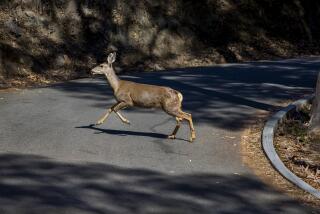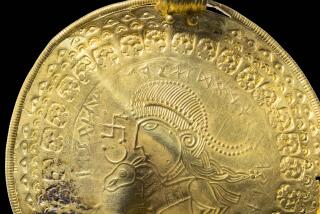Reindeer Guard of Universe in Lapp Tradition : Folklore: In legend among these Scandinavian people, the animal with golden antlers fled across the sky from a hunter in a race against doomsday.
- Share via
HELSINKI, Finland — To modern children, the image of reindeer flashing across the sky means all the good things of Christmas. To the ancient Lapps, it meant fear, awe, maybe even the end of the world.
When Lapp wise men spoke of reindeer in the stars, it was not a tale of comfort and joy, or Santa the jolly elf, but of a race against doomsday.
Lapp storytellers, wintering in smoke-filled huts through weeks of darkness, told of a reindeer with glowing golden antlers that fled across the heavens from a hunter and his dogs.
If the huntsman ever caught the reindeer, the legend said, Earth would crack and chaos would engulf the cosmos.
The Lapps, whose lives are still tied to animals, believed the reindeer in the stars would strike them blind if they stared at it.
“This is a belief going back thousands of years,” said Nilla Outakoski, a theology researcher at the University of Helsinki. “The idea of Santa’s reindeer was introduced to Scandinavia in postcards from America.”
Lapps, who have lived in northern Finland, Sweden, Norway and Russia for 6,000 years, were semi-nomadic hunters and fishermen before they began herding reindeer.
Today many of them earn money by taking tourists for rides in sleighs pulled by reindeer. But they know the animals as the difference between survival and death in the cold north, in legend and in fact.
According to one folk tale, the sun god’s daughter came to Earth, married a Lapp and brought a herd of reindeer as her dowry. Through the union, the northern tribes learned to tame the reindeer, tradition says.
“The reindeer was considered to be a brother--a living, thinking, feeling creature,” said Louise Backman, a Lapp who teaches religion at the University of Stockholm. “The reindeer had a soul, and it offered itself to be killed so that people could eat and be warmly clothed.”
Reindeer also were sacrificed to ensure favorable hunting and good fortune.
“After a reindeer was eaten, its bones had to be left in a special place and be offered to the gods so that a new reindeer would grow,” Outakoski said.
Lapps also believed evil spirits and giants roamed the frozen wilds in the dark time when the sun does not rise above the horizon.
“We were told to stay indoors and beware of a giant that would grab children,” said Backman, 65, whose father herded reindeer in northern Sweden.
Before conversion to Christianity in the 18th and 19th centuries, the Lapps practiced shamanism, the belief that good and evil spirits pervade the Earth.
They believed their shamans, or wise men, were able to commune with gods and spirits and that the shamans used reindeer to settle scores.
“They put their alter egos into large reindeer bucks that battled, sometimes to the death,” Outakoski said.
If the Lapps found a dead shaman, they assumed that his spirit had been in a reindeer battle and lost. If the tribesmen saw two spectacular bucks fighting, it was assumed that two shamans had possessed the animals for a duel.
Christian missionaries told Lapps that their beliefs were satanic, and some zealots ordered shamans killed.
“The Lapp religion was strictly forbidden and much of their culture was wiped out,” said Samuli Aikio, a scholar of the Finnish language. “They were even forbidden to sing their chants.”
Shamanism appears to have survived it all.
In November, researchers found sites where modern Lapps had offered money and reindeer antlers to the spirits of nature.
“There is some evidence of a small revival in ancient Lapp beliefs and religion, and I have heard of practicing shamans,” Outakoski said.
Backman said her people retain the ancient beliefs.
“I clearly remember how, as a little girl, we were in awe of men with shamanistic powers,” she said. “If you did not respect them they could give you a headache or make you ill. We still believe this.”
More to Read
Sign up for Essential California
The most important California stories and recommendations in your inbox every morning.
You may occasionally receive promotional content from the Los Angeles Times.












